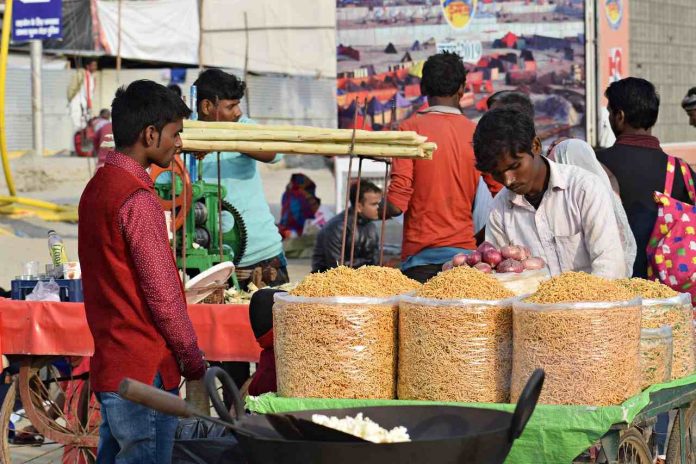
The word democracy is said to have been derived from two Greek words, namely, Demos and Cratos. The word Demos refers to the ‘People’ and the word Cratos means ‘Rule/Power’. Although it is true that there isn’t any nation in this world which can claim to be absolutely democratic in nature. Yet, this article is a melioristic reading of the direction at which one of the largest democracies in the world is navigating its course. Indeed, it is an inevitable fact that the integrity of the head of our State is unquestionable. It is also true that ever since he came to power in 2014, he has made certain unprecedented moves for the betterment of our democracy. Transformation of the Planning Commission into NITI Aayog, monetising certain sectors that failed to yield profit year and after, restructuring of the aviation and defence production systems are some of the commendable steps taken by our beloved Prime Minister Narendra Modi. Also, there is a large chunk of the population in our country which considers the amendment of Article 370, and the establishment of Ram Mandir, a remarkable achievement of the ruling regime. Furthermore, the COVID-19 crisis coupled with the Chinese intrusion into the Indian soil also stimulated foreign businesses, to renounce China, and to invest in India. Nevertheless, this is not the entire story of the socio-economic trajectory taken by our country 2014 onwards.
Pockets of Hegemony
With the duopoly of Jio and Airtel in the telecom sector, the majoritarianism of BJP in the Parliament, the exposure of BJP’s control over Facebook, and the manner in which Ramdev’s Patanjali has been made synonymous to Yoga & Ayurveda over time – democracy, apparently, has been reduced merely to an ethical philosophy of a nostalgic fictional novel.
Market asymmetries, especially in a democratic setup, might look lucrative in the short run. But, in the long run, it not only raises the possibility of monopsony, potential diseconomies of scale, reduced choices for consumers, and unfair influence on the policymakers – it also jeopardizes the public sphere to a considerable degree. No wonder, every critique against the failures of the ruling regime makes us a potential participant of the AAP—TMC—AIMIM camp in the eyes of the new middle class. For instance, every commoner could realize the pathetic condition of our economy at this moment. Scholars could also feel that the distorted priorities since 2014 are now making us pay badly. If the Congress, therefore, has been questioned for corruption, TMC for poor industrial growth rate and appeasement politics, AIMIM for not doing enough to raise the standard of living after the Sachar Committee Report; then, what makes us give our consent to the impeccability of the ruling regime as endorsed by a corporate media?
To begin with, let us look at the “one-medicine-for-all-ills” formula of the ruling regime, i.e. privatisation.
Yes, since privatization tends to have a positive impact in situations where states barely regulate market failure – the case of Air India makes some sense. However, equating the fate of this sector with others and using it as a logic to divest them is not only incoherent, it is also detrimental to the health of our present economy in terms of Employment, Equitable accessibility to basic amenities, level of inflation, and, of course, the crime rate. We all know that the structure of the aviation industry is different from say, ONGC, or for that matter, BHEL. Likewise, even if the political goals of public enterprises often come in conflict with profit maximization – as argued by Shleifer and Vishny, and can be rightly seen in the case of Air India; but, what is the guarantee that a handful of private actors cannot affect the equilibrium of other sectors?Second, the mainstream media, presumably, seems to consider India to be only its urban locales. Apart from around 740 districts, a huge proportion of our nation still resides in the villages. But strangely, only Riya Chakraborty, Prashant Bhushan and Congress are in the crisis for the correspondents of our news channels. Media persons, without doubt, have left no stone unturned to keep the ruler-centric mentality of our milieu intact.
The rhetorics of religious insecurities, for instance, and its allied sensationalism have successfully veneered the economic meltdown so far. Such populists gimmicks have not only it diverted our minds from the real issues of our nation, such as stagflation, hunger, squalor, illiteracy, malnutrition, farmer’s distress, and others – it also made us forget the plight of those in Assam, Bihar, Odisha and Bengal suffering from flood and other damages caused by cyclone Amphan.
Economic Casualties
The growth of our economy decelerated to 6% in 2018-19, and fell further to 4.2% in 2019-20. With the rise of the coronavirus and its impact on our economy, our Home Minister recently blamed the virus for its meagre condition. Well, it was understood and was predicted earlier in my article “Corona Paranoia and the Upcoming Scapegoat of the Economic Failures”.
Unfortunately, this justification from the State is of no use for the denotified nomadic and semi-nomadic communities. It is of no help for the innocuous tribal societies. Tendu leaves, for example, along with Mahua, Sal, Tamarind and others form the means of survival for various indigenous communities – such as Santhals, Gond, Munda among others. They have lost their buyers, their belief-systems have been affected, and many of them have become “walking-class” citizens – following a reverse migration owing to having lost all the opportunities in the cities. But there is no assistance from the State ever since the unplanned lockdown was imposed in our nation. The landlords/contractors/employers have disappeared all of a sudden, and there is no one to pay their wages. Besides, issues related to ethnicism ranging from stigma, verbal abuse to forcible quarantine made their stay difficult in the cities – especially those from the North East.Similarly, the efforts made from the bottom of our society are the least acknowledged & documented by the media houses. Rickshaw pullers, cab drivers, domestic helpers etcetera are in despair. LGBTQ and those in the profession of commercial sex have lost their means of livelihood. How can we, as members of a mature society, expect their kith and kin to appear in the examinations? The irony, yet again, lies in the coy present among the journalists – who claim to be the watchdogs of justice and liberty in our nation. Sometimes, they make me wonder: Does this industry really have anything to offer humanity anymore?
As per the Centre for Monitoring Indian Economy, nearly five million salaried people have lost their jobs in the month of July. Well, this is just an estimation, actual numbers are certainly more than this. To all those, therefore, who are resenting the policy of Reservation must know that the present condition is more due to the excessive dependence on the private sector, rather than what we call positive discrimination. This is so because the private players rely upon the principle of “maximum gain with minimum expenditure” – therefore, when the Corona crisis enveloped the consciousness of the world market, it generated a domino of layoffs worldwide. Economies with advanced technologies and robust manufacturing sector, nevertheless, improvised initially to cope with the situation and are now gradually regaining the momentum. Back in our country, instead of expanding the manufacturing sector, we saw how funds were mobilized towards the construction of statues, CAA-NRC and other such projects. As a corollary, today we have lost our dependability even in our services sector – the backbone of our economy. Neither do we have jobs in the private sector (after a massive move towards privatization) nor do the public organisations have proper funds for their functioning. Even the state governments do not have their GST dues to deal with the spectre of abject poverty. A vicious cycle of unemployment – debauchery – crime has paved its way with the passage of time.After handing over the autonomy of major public sector enterprises to the private individuals/groups, the question in the heart of every economic casualty remains the same: Will the newly selected stakeholders of our economy rescue us from this crisis?Obviously, the answer is ‘NO’. But then, who should they approach to mitigate these ordeals?
Humane Prescriptions
According to McKinsey, India needs to sustain 8–8.5% annual growth to gainfully employ the 60 million new workers expected to join the workforce by 2030. Obviously, we need enormous investments. However, the unrealistic reliance on private investment alone for revitalizing our economy could make us live in a fool’s paradise. The regulatory policy framework, deleveraging, crowding out and financial sector inefficiencies are some of the reasons why the private sector continues to remain ineffective in reducing our concerns. Indeed, the dream to walk side by side with the advanced economies shall remain part of wishful thinking unless the political moochers of India take the responsibility of developing its infrastructure. No form of investment – be it foreign, or domestic – would feel interested in investing without an environment conducive to trade & commerce. Surprisingly, nobody knows why the annual report of the RBI didn’t explain why the foreigners would want to invest in a loss-making enterprise such as the Indian railways. It is high time, therefore, to recall the ideas of John Maynard Keynes and his magnum opus The General Theory of Employment, Interest and Money. Given the present scenario, the government needs to restructure public enterprises in order to curb further losses. It also needs to fund and expand the MSMEs which, unlike the large corporations, are capable of absorbing both skilled as well as the unskilled labourers. Along with this, it desperately needs to invest in the large infrastructural development projects to deal with the menace of rising unemployment. Indeed, this carries along with it the threat of galloping inflation – but, that can be dealt later on through the monetary and, if required, fiscal policies. Also, huge spending needs to be done on the research and development of our indigenous products so that they can become competitive in the world market. Only focusing upon the supply side – by waiving off the corporate taxes time and again – and ignoring to boost the demand side altogether, won’t make any substantial ascent, no matter how hard we try. Hence, an adamant thought of reducing the fiscal deficit overnight is going to backfire at this point in time.
This is precisely the moment to go for the idea of Bad Bank, or what the Economic Survey of 2017 called “Public Sector Asset Rehabilitation Agency (PARA)”, to help tide over the stressed assets. Furthermore, taxes should be levied, and in fact nominally raised, on companies dealing with disinfectants, antiseptics, cleaning supplies and masks. Internet video on demand service providers such as AmazonPrime, NETFLIX, Disney+ and others should be treated similarly along with the owners of our gig economy, such as Zomato, Swiggy et cetera. Only people-oriented economic policies, and not person-specific corporate-induced politics, can make Indian democracy regain its meaning amid the coronavirus pandemic. Otherwise, only a few corporate giant will continue to benefit at the cost of millions of Indian citizens. Would we like our democracy to be owned and run by a handful of vested interests?













